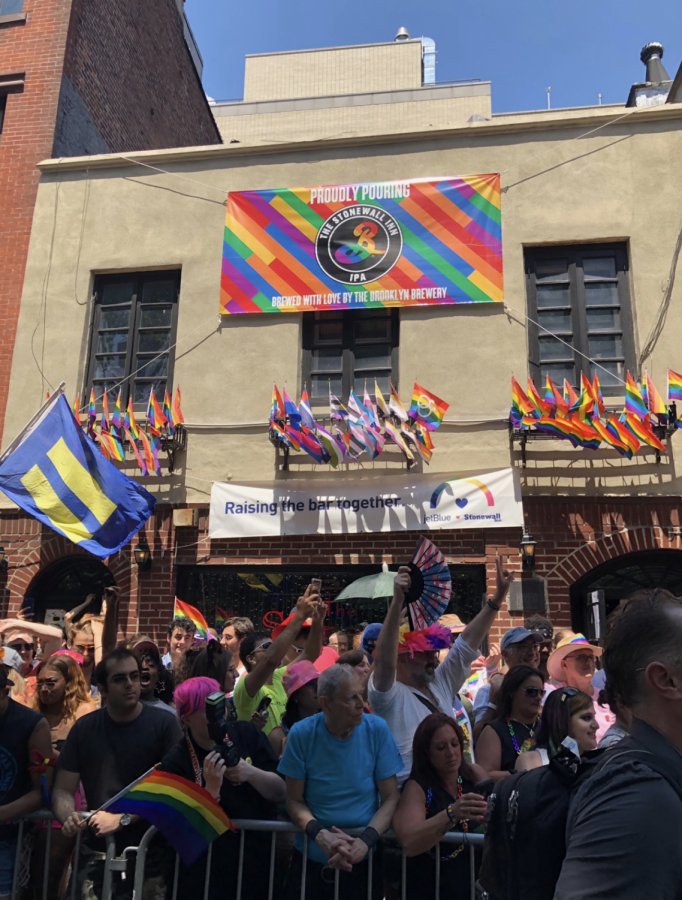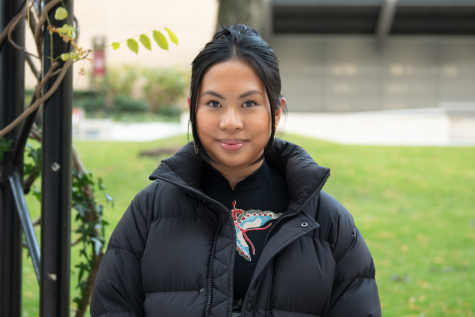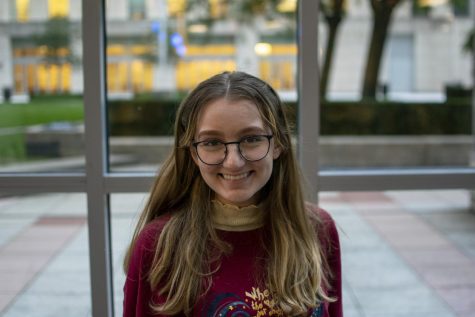How to Be a Good Ally During Pride
And the rest of the year
COURTNEY BROGLE/THE OBSERVER
Pride participants celebrating outside of The Stonewall Inn, where the modern gay rights movement began in 1969.
August 25, 2019
For one month out of the year, city streets and corporation windows are filled with rainbows and glitter and displays of love. I have always wanted to join in on the festivities — who doesn’t? Though I am not queer myself, I have many friends who identify as LGBTQ. I want to celebrate them, but I’d never known if I was welcome in that space. Turns out, I am.
Having straight and cisgender allies that are both dedicated and respectful are crucial to the progress of the movement towards mainstream acceptance. Thus, straight people are very much welcome join the celebration every June; however, there’s a line between genuine celebration and joining in just for an Instagram picture.
So how can I, as a cisgender and heterosexual person, be a good ally to my LGBTQ friends? To find the answer, I simply asked them.
Many advised me to know my LGBTQ history. Pride may seem like a party, but it wasn’t always this way. The modern gay rights movement — and subsequently Pride — is rooted in the violent riots at The Stonewall Inn in 1969. The joyous celebration that we know today is the result of an uprising headed by transgender women of color, such as Marsha P. Johnson. As Ky Hayward, Fordham College at Lincoln Center (FCLC) ’21, puts it, “it used to be a funeral march.”
Fifty years have passed since the Stonewall Riots. A lot of progress towards equality has been made since then, but there is still a long way to go. There is still legislation that oppresses queer people. For example, U.S. Department of Defense regulations currently bars transgender persons from serving in the military, though the Pentagon announced in 2015 that it was formulating a policy that would allow transgender soldiers to serve. This follows the 2010 repeal of “Don’t Ask, Don’t Tell,” the federal policy that barred gay people from openly serving in the military.
LGBTQ history goes far beyond 1969, so it can be a lot to take in. Regardless, it’s important to know as an ally. If you don’t know LGBTQ history, don’t be afraid to ask. Madonna said “express yourself;” Marina Vergara, FCLC ‘22, says “educate yourself.”
My friends advised me to join the Pride festivities, but to know my place. Hayward said to “remember that this is a space designed for us to be ourselves, and if we are welcoming you into it, please remember that and please be respectful.”
Quite simply, just be respectful. This includes only entering spaces in which you are welcome. Your presence is powerful because it signifies your support. Being respectful includes asking for pronouns and normalizing giving out yours, as suggested by Gillian Russo, FCLC ’21. (Mine are she/her.)
Being respectful includes refraining from making a spectacle out of Pride. Yes, it’s colorful and flamboyant, but it’s not a zoo exhibition. Don’t treat it as such. Being respectful also includes refraining from trying “gay things” for the sake of celebrating Pride, as suggested by Cameron Dasher, FCLC ’22. Just be present and celebrate queer people as you are.
Next, they advised me to defend my queer friends. If I see someone make homophobic or transphobic jokes, I need to call them out and educate them. As a straight person, I don’t experience the targeted hate that many people in the LGBTQ community face. I should acknowledge my privilege and use it to do some good.
But the true hallmark of a good ally is year-round dedication to the cause. Just because Pride month is over on July 1, the hardships that the LGBTQ community face don’t go away for the other 11 months of the year. There won’t be parties and parades to attend, but there are still things you can do. Hayward urges that we pay attention to where our money goes. They urge us to invest in businesses built and run by queer and transgender persons. (My favorite shops are Ash + Chess and Double Denim Dude, who are located in Brooklyn and Queens, respectively.) They also encourage us to donate what we can to organizations that fight for LGBTQ equality, such as The Human Rights Campaign, Planned Parenthood and the Sylvia Rivera Law Project.
Allyship isn’t something that you can pull out of your back pocket come June. Likewise, Pride isn’t a backdrop for your Hot Girl (or Boy or Non-Binary) Summer Instagram post. It began as a riot, and it is a celebration of progress, but there is still so far to go.
One last thing — Charles Scheland, FCLC ’20, advised me to “thank my queer friends for how they enrich your life.” So consider this one big thank you to all of the queer people I have met and to all of the queer people I will meet. Your constant resilience in the face of adversity inspires me, and you have taught me what true loyalty means. You bring color to my life and you never fail to teach me new things about the world and myself. You have taught me the power of love. Thank you.














